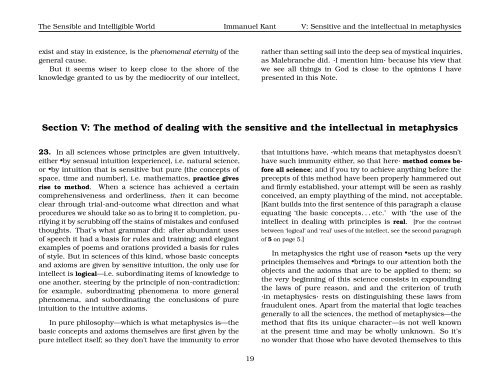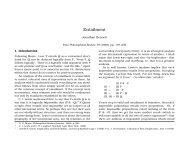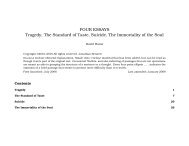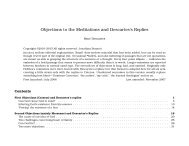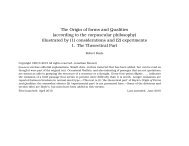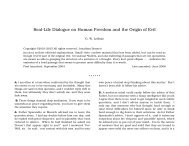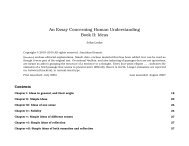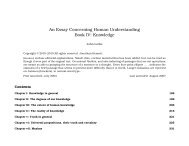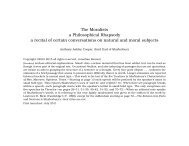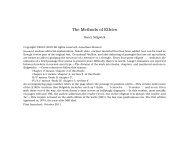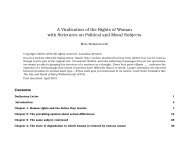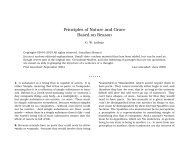The Form and Principles of the Sensible and Intelligible World
The Form and Principles of the Sensible and Intelligible World
The Form and Principles of the Sensible and Intelligible World
You also want an ePaper? Increase the reach of your titles
YUMPU automatically turns print PDFs into web optimized ePapers that Google loves.
<strong>The</strong> <strong>Sensible</strong> <strong>and</strong> <strong>Intelligible</strong> <strong>World</strong> Immanuel Kant V: Sensitive <strong>and</strong> <strong>the</strong> intellectual in metaphysics<br />
exist <strong>and</strong> stay in existence, is <strong>the</strong> phenomenal eternity <strong>of</strong> <strong>the</strong><br />
general cause.<br />
But it seems wiser to keep close to <strong>the</strong> shore <strong>of</strong> <strong>the</strong><br />
knowledge granted to us by <strong>the</strong> mediocrity <strong>of</strong> our intellect,<br />
ra<strong>the</strong>r than setting sail into <strong>the</strong> deep sea <strong>of</strong> mystical inquiries,<br />
as Malebranche did. ·I mention him· because his view that<br />
we see all things in God is close to <strong>the</strong> opinions I have<br />
presented in this Note.<br />
Section V: <strong>The</strong> method <strong>of</strong> dealing with <strong>the</strong> sensitive <strong>and</strong> <strong>the</strong> intellectual in metaphysics<br />
23. In all sciences whose principles are given intuitively,<br />
ei<strong>the</strong>r •by sensual intuition (experience), i.e. natural science,<br />
or •by intuition that is sensitive but pure (<strong>the</strong> concepts <strong>of</strong><br />
space, time <strong>and</strong> number), i.e. ma<strong>the</strong>matics, practice gives<br />
rise to method. When a science has achieved a certain<br />
comprehensiveness <strong>and</strong> orderliness, <strong>the</strong>n it can become<br />
clear through trial-<strong>and</strong>-outcome what direction <strong>and</strong> what<br />
procedures we should take so as to bring it to completion, purifying<br />
it by scrubbing <strong>of</strong>f <strong>the</strong> stains <strong>of</strong> mistakes <strong>and</strong> confused<br />
thoughts. That’s what grammar did: after abundant uses<br />
<strong>of</strong> speech it had a basis for rules <strong>and</strong> training; <strong>and</strong> elegant<br />
examples <strong>of</strong> poems <strong>and</strong> orations provided a basis for rules<br />
<strong>of</strong> style. But in sciences <strong>of</strong> this kind, whose basic concepts<br />
<strong>and</strong> axioms are given by sensitive intuition, <strong>the</strong> only use for<br />
intellect is logical—i.e. subordinating items <strong>of</strong> knowledge to<br />
one ano<strong>the</strong>r, steering by <strong>the</strong> principle <strong>of</strong> non-contradiction:<br />
for example, subordinating phenomena to more general<br />
phenomena, <strong>and</strong> subordinating <strong>the</strong> conclusions <strong>of</strong> pure<br />
intuition to <strong>the</strong> intuitive axioms.<br />
In pure philosophy—which is what metaphysics is—<strong>the</strong><br />
basic concepts <strong>and</strong> axioms <strong>the</strong>mselves are first given by <strong>the</strong><br />
pure intellect itself; so <strong>the</strong>y don’t have <strong>the</strong> immunity to error<br />
19<br />
that intuitions have, ·which means that metaphysics doesn’t<br />
have such immunity ei<strong>the</strong>r, so that here· method comes before<br />
all science; <strong>and</strong> if you try to achieve anything before <strong>the</strong><br />
precepts <strong>of</strong> this method have been properly hammered out<br />
<strong>and</strong> firmly established, your attempt will be seen as rashly<br />
conceived, an empty plaything <strong>of</strong> <strong>the</strong> mind, not acceptable.<br />
[Kant builds into <strong>the</strong> first sentence <strong>of</strong> this paragraph a clause<br />
equating ‘<strong>the</strong> basic concepts. . . etc.’ with ‘<strong>the</strong> use <strong>of</strong> <strong>the</strong><br />
intellect in dealing with principles is real. [For <strong>the</strong> contrast<br />
between ‘logical’ <strong>and</strong> ‘real’ uses <strong>of</strong> <strong>the</strong> intellect, see <strong>the</strong> second paragraph<br />
<strong>of</strong> 5 on page 5.]<br />
In metaphysics <strong>the</strong> right use <strong>of</strong> reason •sets up <strong>the</strong> very<br />
principles <strong>the</strong>mselves <strong>and</strong> •brings to our attention both <strong>the</strong><br />
objects <strong>and</strong> <strong>the</strong> axioms that are to be applied to <strong>the</strong>m; so<br />
<strong>the</strong> very beginning <strong>of</strong> this science consists in expounding<br />
<strong>the</strong> laws <strong>of</strong> pure reason, <strong>and</strong> <strong>and</strong> <strong>the</strong> criterion <strong>of</strong> truth<br />
·in metaphysics· rests on distinguishing <strong>the</strong>se laws from<br />
fraudulent ones. Apart from <strong>the</strong> material that logic teaches<br />
generally to all <strong>the</strong> sciences, <strong>the</strong> method <strong>of</strong> metaphysics—<strong>the</strong><br />
method that fits its unique character—is not well known<br />
at <strong>the</strong> present time <strong>and</strong> may be wholly unknown. So it’s<br />
no wonder that those who have devoted <strong>the</strong>mselves to this


